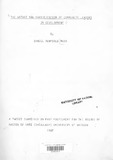| dc.description.abstract | Kenya's recent development planning process has emphasized on the participation of Kenyans in the nation's development process. This is to be attained through the District Focus Strategy for Rural Development policy, which came into effect on 1st July, 1983. A central thesis of this study is that participation by local people in the development planning process ensures their sacrifice and commitment to the development projects and thus is an essential step towards the attainment of rural development. Local leadership is seen as an important ingredient in the process of initiating and sustaining rural development. The study identified the self help movement as one of the major ways through which participation in rural development has been successfully accomplished.
Using data collected through survey research (interview schedule, unstructured interviews, available data, simple observation and compilation of case studies, the study argues that participation in self help activities is determined by such factors as the participants socio - demographic characteristics, the benefits attainable, the perception and commitment of the participants to development activities. The study argues that the type of leadership available at the
local level, that is, community level determines the amount of development that may be attained. Poverty was identified as a major constraint to the effectiveness of leadership, and the level of
participation leaders and members of self help groups may put into development activities.
The study established that leaders and non-leaders in the self help movement tend to have different socio-demographic characteristics. This is especially in view of the social values attached to the various socio-demographic attributes, such as age, sex, education etc. by the community. The study found that community leaders are articulate about the development needs and problems in their areas. It, however, recommends that structures for participation in rural development decision-making namely, viIlage and locational development committees, need to be established where they do not exist, and where they exist, they need to be revitalised, for effective rural development management. | en |

